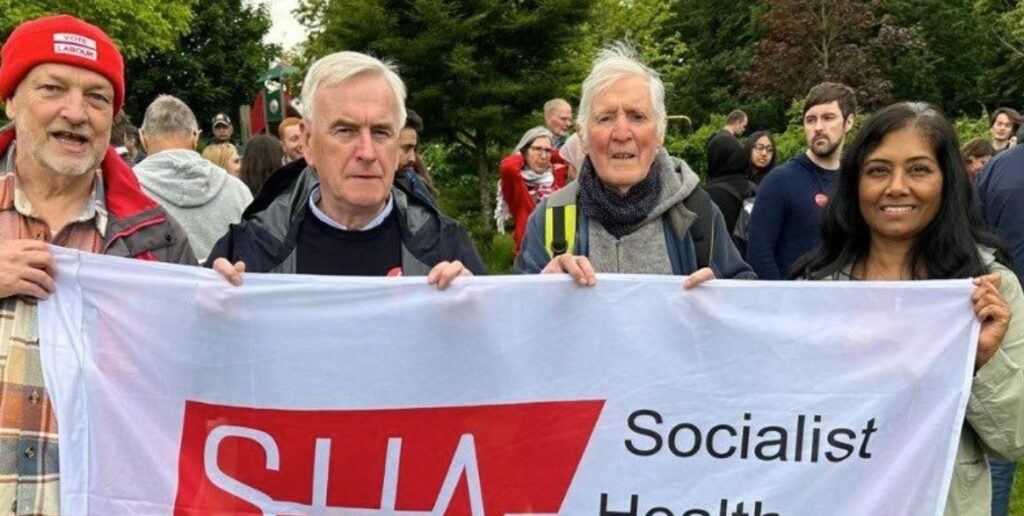 The SHA responds to the Chancellor’s Spring statement
The SHA responds to the Chancellor’s Spring statementThe Socialist Health Association released the following statement after Rachel Reeves’ Spring budget statement:
Last year, the Socialist Health Association campaigned throughout the country to help return a Labour government. We donated, we promoted and our members travelled up and down the country, often at their own expense, to canvass for candidates who shared our fundamental Labour values and supported the reinstatement of a fully publicly provided, fully free, fully staffed NHS. Inherent in these values is a commitment to fighting inequalities and protecting the most vulnerable members of our society.
The Chancellor’s Spring Statement today aligns the government, not with change and a return to Labour values, but instead with an expansion of the disastrous policies of austerity introduced by the previous Conservative government.
In the run-up to today’s announcement, much has been to done to stigmatise people with disability and chronic illness, implying that many seek help illegitimately. Health Secretary Wes Streeting recently announced an “overdiagnosis” of mental health conditions in the country. In response, the Royal College of Psychiatrists explained that the rise in mental illness was in fact driven by “real societal challenges and lack of available treatment”. DPAC (Disabled People Against the Cuts) report that current PIP fraud rates are 0%.
What makes Reeves’ proposed cuts to welfare particularly heinous is the wealth of research that has evidenced the impact of austerity:
- public sector job losses between 2010-12 correlated with suicide rate rises of up to 20%,
- imposing strict criteria for evidence of seeking work on unemployment benefit claimants, as was previously introduced in the UK, increases depression, food insecurity and homelessness
- cuts to welfare spending in UK and Europe has led to increased food insecurity and decreased access to healthy diets,
- several suicides amongst disabled people have been linked to assessment, handling or rejection of disability benefit claims, and
- austerity has contributed to increases in the number of children living in poverty across the UK(Labour’s previous refusal to lift the 2-child benefit cap has done nothing to alleviate this).
The impact of today’s cuts is yet to be fully understood and publication of an independent equality impact assessment is urgently needed. The government’s own assessment estimates that the measures announced today will push 250,000 people into poverty by the end of the decade, including 50,000 children8. Disabled people tell us that they will be unable to work, live in dignity or in many cases, simply live. The impact will fall also on their children and their carers.
Some areas did see an injection of funding today – most notably the defence industry, which will now be even more well equipped to kill and maim around the world, thanks to an unprecedented slashing of the international aid budget, again targeting the poor and vulnerable.
Austerity affects health in two ways – by increasing poverty, homelessness and unemployment while cutting social safety nets, leading to increased ill health; and by direct cuts to health services. A healthy economy needs a healthy workforce, who can bolster the economy through their own spending and pay fair taxes to support the vulnerable and public services. The welfare cuts announced today are more likely to do the opposite.
Beyond that is the morality of risking the health and lives of some of the poorest and most vulnerable members of society, simply to enforce a political choice. Reeves’ “fiscal rules” are simply that – a political choice. Inherent in governing is the responsibility for its citizens – all of them. Today our government chose to abandon that responsibility.
[Republished from the website of the SHA, original here, including references and hyperlinks. Feature picture from SHA web page]
 Keep Grangemouth Working campaign - By David Cartwright, Unite, Glasgow Retired Members’ Branch Since last November, a campaign has been underway to save oil refinery jobs at Grangemouth in Central
Keep Grangemouth Working campaign - By David Cartwright, Unite, Glasgow Retired Members’ Branch Since last November, a campaign has been underway to save oil refinery jobs at Grangemouth in Central The High Speed train – is it worth the cost? - TV review by Mark Langabeer, Hastings and Rye Labour member This week’s Panorama programme investigated the reasons behind the ballooning costs of HS2, the high-speed rail
The High Speed train – is it worth the cost? - TV review by Mark Langabeer, Hastings and Rye Labour member This week’s Panorama programme investigated the reasons behind the ballooning costs of HS2, the high-speed rail The NHS review, and what it doesn’t touch - By John Pickard The most glaring omission of the Darzi review of NHS England is the extent to which the service is plundered for private
The NHS review, and what it doesn’t touch - By John Pickard The most glaring omission of the Darzi review of NHS England is the extent to which the service is plundered for private The perils of social media: how dangerous is it? - By Joe Langabeer Lately, I’ve been enjoying the podcast Tech Won’t Save Us, which is hosted by Paris Marx. Marx has been a critical technology
The perils of social media: how dangerous is it? - By Joe Langabeer Lately, I’ve been enjoying the podcast Tech Won’t Save Us, which is hosted by Paris Marx. Marx has been a critical technology SHA protests against the dilution of doctors’ qualifications - By Left Horizons reporters. In a press release, the Socialist Health Association has expressed its “deep concern” about the creation of a “two tier health
SHA protests against the dilution of doctors’ qualifications - By Left Horizons reporters. In a press release, the Socialist Health Association has expressed its “deep concern” about the creation of a “two tier health

